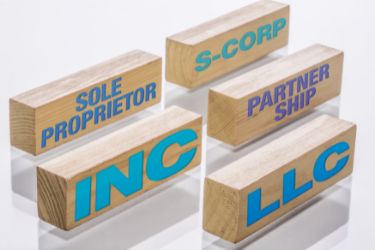

When you start a business, you have several options regarding how it is structured. This can be a difficult decision, as the wrong structure can hinder your ability to reach your goals due to potential consequences like personal liabilities and double taxation. This blog post will discuss the benefits and drawbacks of each of the different types of business entities and how to choose the right business structure for your small business.

A business structure is a legal designation that determines how a business is organized. There are several different types of business structures, each with its own advantages and disadvantages. The most common types of business structures are sole proprietorships, partnerships, limited liability companies (LLCs), and corporations.
These business structures vary greatly from one another. For example, sole proprietorships and partnerships are not separate entities from their owners. This means that the business owners are personally liable for all debts and obligations of the business. In contrast, LLCs and corporations are separate legal entities from their owners. There are many other differences between these business structures, including how they are taxed and how easy they are to set up.
Choosing the most suitable structure for your business is a critical decision that should not be taken lightly. There are many reasons for this, but perhaps the most important is that it will have a significant impact on how your business is taxed.
For example, sole proprietorships and partnerships are taxed as pass-through entities. This means that the business owners pay taxes on their personal income tax returns. In contrast, corporations are taxed at the corporate tax rate. This means that the business pays taxes on its profits, and the owners pay taxes on their personal income.
Choosing the right business structure is also important because it can impact your ability to raise capital. For example, venture capitalists are more likely to invest in corporations than sole proprietorships or partnerships.
Lastly, the type of business structure you choose will determine what kind of paperwork you need to file with the government. For example, LLCs need to file an operating agreement. Sole proprietorships and partnerships do not need to file any special paperwork, but they may need to file annual reports.
You should keep in mind that you can always change your business structure in the future if it no longer suits your needs. However, it is still important to choose a business structure that works best for the current state of your business from the outset. Taking the time to do this will save you a lot of headaches down the road.

The advantages and drawbacks of each type of business structure are listed below to help you weigh them against your unique needs.
Sole proprietorships are owned by one person, and there is no legal distinction between the owner and the business. This means that the owner is personally liable for all debts and liabilities of the business.
Pros of Sole Proprietorships
Low cost: Sole proprietorships have the lowest startup and ongoing costs of any business structure.
Simple: Sole proprietorships are the simplest type of business to set up and operate. One reason for this is that they are subject to fewer government regulations than other types of businesses.
Low risk: Since sole proprietorships have only one owner, they are less risky than businesses with multiple owners.
Straightforward taxation: The owner of a sole proprietorship only has to pay taxes on their personal income tax return. In many cases, this can result in lower taxes compared to paying separately as a business entity.
Cons of Sole Proprietorships

Personal liability: One of the biggest disadvantages of sole proprietorships is that the owner is personally liable for all debts and liabilities of the business. This means that if the business is sued, the owner’s personal assets are at risk.
Lower growth potential: It can be difficult for sole proprietorships to raise capital because there is only one owner. This can limit the growth potential of the business.
Business continuity: If the owner of a sole proprietorship dies or becomes incapacitated, the business will likely have to be sold or shut down.
Partnerships are similar to sole proprietorships in that they are owned by two or more people, and the owners are personally liable for all debts and liabilities of the business.
Partnerships can be either general partnerships or limited partnerships. In a general partnership, all partners share equally in the profits and losses of the business. In a limited partnership, there is at least one partner who is only responsible for the debts and liabilities of the business up to the amount of their investment.
Pros of Partnerships
Low risk: Partnerships are less risky than sole proprietorships because there is more than one owner. This means that if one partner dies or becomes incapacitated, the business can continue to operate.
Equal responsibility: In a general partnership, all partners share equally in the profits and losses of the business. This can be an advantage because it motivates all partners to work hard to grow the business.
Collaborative structure: Partnerships can be a good way to combine the talents and resources of two or more people. This can make the business more successful than if each person worked independently.
Cons of Partnerships

Personal liability: Like sole proprietorships, partnerships are subject to the principle of unlimited personal liability. This means that each partner is personally liable for all debts and liabilities of the business.
Shared liability: In a partnership, each partner is liable for the actions taken by the other. This means that each partner is at risk of losing their assets if the other makes a poor decision on behalf of the business.
LLCs are a type of business structure that offers personal liability protection to its owners. This makes them one of the most popular business structures among small business owners.
When you form an LLC, you will have the choice between two LLC structures: a single-member LLC or a multi-member LLC. In a single-member LLC, there is only one owner who is not personally liable for the debts and liabilities of the business. In a multi-member LLC, there are two or more owners who are not personally liable for the debts and liabilities of the business.
Pros of LLCs
Protection of personal assets: One of the largest draws of LLCs is that the owners are not personally liable for the debts and liabilities of the business. This means that their personal assets are protected in the event that the business is sued.
Flexible taxation: LLCs are taxed as pass-through entities. This means that the profits and losses of the business are “passed through” to the owners and reported on their personal tax returns. While pass-through taxation is standard for LLCs, they also have the option of being taxed as an S corporation. With this option, businesses can opt to pay taxes independently from the owner. This gives business owners the freedom and flexibility to choose a tax structure that works best for them.
Flexible operations: LLCs have more flexibility in how they are operated than corporations. With fewer regulations on LLC operations, LLCs can be run in a way that best suits the needs of the business.
Cons of LLCs
Limited investor potential: Investors are less likely to invest in an LLC than a corporation. Some are subject to laws that prevent them from investing in anything but corporations, while others simply prefer to avoid LLCs. As a result, LLCs may have difficulty raising capital, which can limit their growth potential.

Corporations are owned by shareholders who elect a board of directors to manage the company. The shareholders are not personally liable for the debts and liabilities of the business. Corporations are subject to corporate income tax, which is a tax on the profits of the business.
An S corporation is a type of corporation that has elected to be taxed as a pass-through entity. This means that the profits and losses of the business are “passed through” to the shareholders and reported on their personal tax returns. S corporations are only available to businesses with 100 or fewer shareholders, making them a popular choice for LLCs that have begun to outgrow their original structure.
Another type of corporation is the C corporation. C corporations are taxed independently from their shareholders. This means that the business pays taxes on its profits, and the shareholders pay taxes on the dividends they receive from the business. Unlike S corporations, C corporations are subject to double taxation, which means that the business is taxed on its profits, and the shareholders are taxed on their dividends.
Pros of Corporations
Personal asset protection: Like LLCs, corporations generally offer personal asset protection to their shareholders. This means that the shareholders’ personal assets are protected in the event that the business is sued.
Registration as an entity: Corporations are legally registered as entities, which allows them to take action separately from the business owners. For example, a corporation can enter into contracts, own property, and sue or be sued in its own name. This also grants businesses protection under the wide range of privileges built into corporate laws.
Encourages investors: Because corporations have a legal existence separate from their shareholders, they are often seen as more stable and less risky investments. As a result, businesses that are looking to raise capital may have an easier time doing so if they are structured as a corporation.
Tax advantages: Corporations may be eligible for certain tax advantages that are not available to other business structures. For example, corporations can typically deduct the cost of health insurance premiums paid for their employees. Other benefits to employees, including some of those on our list of creative employee benefits ideas, may also come with tax advantages for corporations.
Cons of Corporations
High risk: Corporations are subject to higher risks than other business structures due to the significant capital that goes into starting this type of business. It's also more difficult and expensive to dissolve a corporation, which brings greater financial risk to starting one.
Rigid operations requirements: Corporations are subject to a greater number of regulations than LLCs. These regulations can limit the flexibility of how a corporation is operated and place added expenses on the business.
There are several factors that you should consider when choosing a business structure. These include the following:

If you are still unsure about which type of business structure is right for you, there are many resources available to help you make this decision. You can speak to an accountant or attorney, read books on the topic, or attend workshops or seminars for additional guidance on how to choose the right business structure.
The most important thing to remember when choosing a business structure is that there is no one-size-fits-all solution. The right choice for your business will depend on a variety of factors, including the type of business you are running, the number of owners you have, and your long-term goals for the business. With a bit of research and ambition, you'll soon be up and running with the business structure that best suits your needs.
For more useful information to help you on your entrepreneurship journey, sign up for the e marketing newsletter and get insightful small business news conveniently delivered to your inbox. And while you focus on the business side of things, the team at E-Marketing Associates is here to take the burden of marketing off your shoulders. From website design to SEO and social media, we have the products and software to help your small business grow.
Pass-through entities like sole proprietorships, partnerships, and most LLCs report profits on owners' personal returns, avoiding corporate tax. Corporations pay corporate income tax, and shareholders may also pay tax on dividends, causing potential double taxation unless S corporation status is elected.
Personal liability is unlimited in sole proprietorships and general partnerships; owners' personal assets can satisfy business debts. LLCs and corporations create a separate legal entity, so owners or shareholders generally aren't personally responsible beyond their investment, barring fraud or personal guarantees.
Yes. You can convert a sole proprietorship to an LLC or corporation, or elect S corporation status later. Conversions require state filings, possible fees, and tax considerations, but they're common when liability concerns, investor demands, or growth outpace the original structure.
Investors often favor corporations because shares are easily issued, ownership is clearly documented, and corporate law provides predictable governance. Some investment funds are legally barred from buying into LLCs or partnerships, making the corporate form more attractive for raising large amounts of capital.
For a one-person business seeking minimal cost and paperwork, a sole proprietorship is usually simplest. You operate under your own name or a DBA, report income on your personal return, and face few ongoing filings. However, remember you accept unlimited personal liability.